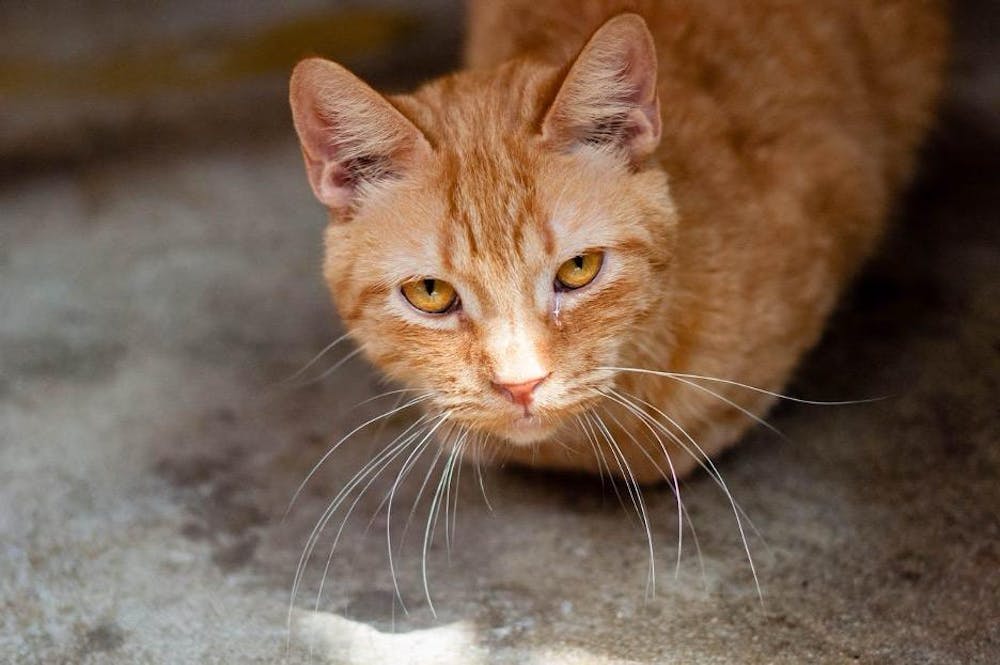Cats don’t exactly file symptom reports. One day, they’re using their self-cleaning litter box like usual, eating their meals, and throwing shade from the windowsill — and the next, they’re hiding under the bed and refusing treats. It’s their thing: act normal until something’s really not.
That’s why it helps to know what to look for, like changes in appetite, weird bathroom habits, or suddenly turning their nose up at the treats they loved yesterday. If your cat’s acting a little off, here are the signs it might be time to pay closer attention and what you can do to help.
1. They’re Not Eating Like They Usually Do
Cats are creatures of habit, especially when it comes to food. So, if yours starts picking at meals, skipping them entirely, or suddenly turns into a bottomless pit, it’s worth paying attention. A loss of appetite can point to anything from dental pain to GI issues, while increased hunger in older cats can be tied to conditions like hyperthyroidism or diabetes.
Before spiraling into worst-case scenarios, think through any recent changes: new food, added stress, or even a different feeding schedule. Check in with your vet if they miss more than a day of meals or seem unusually fixated on food. Bring specifics — how much they’re eating, what kind, and how long it’s been weird — so your vet isn’t working off guesses.
2. Something’s Off in the Litter Box
Let’s be real: nobody wants to keep tabs on poop, but it can tell you a lot. Diarrhea, constipation, frequent urination, or missing the box altogether? All red flags. Trouble peeing — like straining or just dribbling a few drops — can be an emergency, especially in male cats, where urinary blockages can turn serious fast.
Even subtle changes — like going more often or litter piling up faster than usual — can be signs of an underlying issue. Dehydration, kidney disease, infections, or even stress can all affect bathroom behavior. Don’t wait on this one; if their routine shifts noticeably, a vet visit is the safest move.
3. They're Suddenly MIA
Cats love a good hide-and-seek session, but something might be wrong if yours is suddenly spending hours tucked behind furniture or avoiding their favorite hangouts. Illness and pain often make cats withdraw — it’s a survival instinct to hide when they’re feeling vulnerable.
If this is out of character for your cat, try coaxing them out gently with a treat or their go-to toy. No interest? That’s your sign. If they’re also skipping meals or avoiding interaction altogether, it’s time to call in a professional. Even subtle behavior shifts — think less cuddling or fewer zoomies — can be their quiet way of saying, “Hey, I’m not okay.”
4. They’re Losing (or Gaining) Weight Without Trying
Weight changes in cats often sneak up on you. You might not notice until one day, they feel bonier during a cuddle, or their belly suddenly hangs a little lower than usual. Unexplained weight loss can be linked to hyperthyroidism, diabetes, parasites, or digestive disorders. Unexpected gain could point to hypothyroidism, fluid retention, or overeating tied to boredom or stress.
The best way to catch it early is to give them a once-over regularly. Run your hands along their back and ribs — if you feel sharp bones or they’ve developed a new squish, it’s worth booking a weigh-in with your vet. Tracking it on your own? A baby scale or pet scale can be surprisingly helpful.
5. Their Coat Looks Off
A healthy cat usually has a sleek, soft coat — it’s one of those little indicators that things are working as they should. So, if your cat’s fur suddenly looks greasy, flaky, dull, or patchy, don’t brush it off.
Cats that don’t feel well often stop grooming themselves. That can happen with dental pain, arthritis, or anything else that drains their energy. If your cat’s usually fastidious and now looks a little disheveled, that’s your cue to dig deeper. Combine that with other odd behavior — less energy, skipping meals — and it’s worth getting them checked out.
6. They're Drinking Way More Water Than Normal
Take note if you’re suddenly refilling the water bowl twice as often or noticing your cat hanging around the sink like it’s a new hobby. Increased thirst is often one of the early signs of chronic conditions like kidney disease or diabetes.
It’s easy to miss if you’ve got a fountain or multiple water bowls around the house, so start watching for patterns. Are they drinking longer? Seeking water from weird places (like the shower floor)? Combine that with more frequent urination or weight loss, and you’ve got a clear sign that something could be up.
Don’t Wait for a Meow for Help
Cats aren’t great at asking for help — that part’s on us. If something feels off, it probably is. You know your cat better than anyone, and spotting these signs early can make all the difference. Whether it’s a quick check-in or a deeper look, trust what you're noticing. Better safe than sorry (and better now than too late).
This post is provided by a third party who may receive compensation from the products or services they mention.


